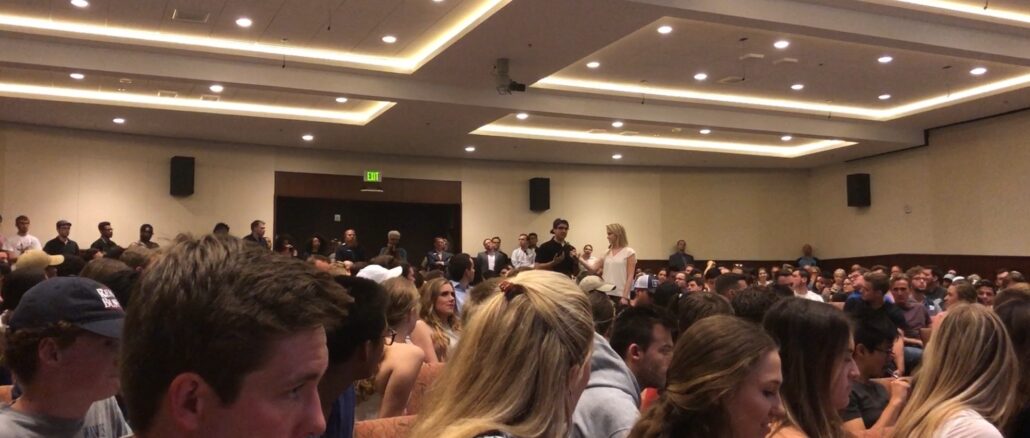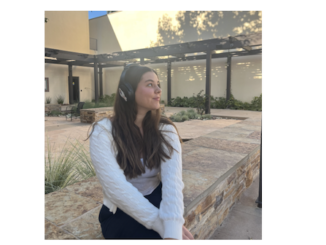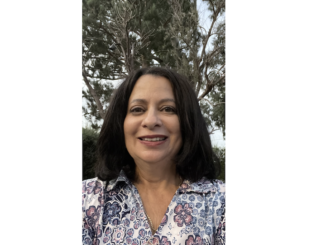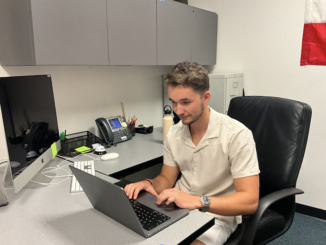
Pepperdine students add to the stereotype that young Americans are apathetic when it it comes to politics.
Low voter turnout, lack of political involvement and lack of knowledge about politics is typical for young Americans. Pepperdine students are no exception as they avoid political involvement on campus.
“Younger 18 to 19-year-olds just don’t see that desire or need or the importance of voting,” said Austin Welch, who is president of both the Pepperdine Student Government Association and College Republicans, “which is difficult because we would be the largest deciding factor if we all chose to go out and vote and exercise our right.”
Faculty and students agreed that young Americans lack political involvement but they each have a unique approach on how this problem can be overcome, from more political education to more emphasis on the importance of voting.
Voter turnout
According to the Pew Research Center, some 49 percent of millennials, anyone born between 1981 and 1996, voted in the 2016 presidential election. While only Pepperdine seniors are considered millennials based on Pew’s definition, Pew’s data points to young American voting turnout.
A Pepp Post poll of 57 students found that Pepperdine students parallel this statistic as 49 percent of students said they voted in the past presidential election. However, 82 percent of those who didn’t vote said it was because they were not yet 18.
According to the Pew Research Center, the percentage of millennials who voted increased roughly 3 percent between the 2012 election and 2016 election.
The poll asked participants why young people do not vote. The results varied, as participants were allowed to choose more than one answer.
The poll found that roughly 75 percent of those surveyed believe that young Americans are not educated enough on politics.
Political apathy has shifted in the first year of President Donald Trump’s administration, with some young Americans leading recent protest marches for gun control and women’s rights.
“Donald Trump might help young people overcome apathy toward voting,” Sociology Professor Robin Perrin said.
First-years and fellow Democrats, Taylor Launius, an integrated marketing communication major, and Cameron Lowenfield, an international business major, both participated in the Los Angeles Women’s March Jan. 20. Lowenfield said she went to support women.
“It was really nice that everyone came together to support women in a nonpartisan way,” Lowenfield said.
Why are young Americans so apathetic toward politics?
Pete Peterson, Pepperdine School of Public Policy dean, said he believes voting and civic participation are acts of love.
“You have to love where you live,” Peterson said.
Young Americans are ethnocentric, Peterson said. They often lose sight of the fact that living in the United States is a unique privilege and therefore disregard the freedoms that come along with it. Many countries around the world don’t allow their citizens to vote.
Political Science Professor Christopher Soper believes there is a disconnect between young Americans and politics.
“They don’t yet know the way in which political decisions impact them,” Soper said.
Students are often uneducated on the importance of voting, Soper said. It is hard to encourage someone to vote when they do not believe their vote is significant enough to make a difference.
Peterson referred to the belief that one vote will not matter as “rational ignorance.” Some elections are so close that one vote is very important. It becomes a trend, one American may believe they are the only one not voting but then a million other people are thinking the same thing. This adds up and impacts voter turnout.
Perrin said the lack of voting may just be because “college students are just really busy.”
Additionally, many young Americans are off at college and have to request an absentee ballot to vote. This makes voting less “desirable and accessible,” Soper said.
Students’ thoughts
Overall, approximately 69 percent of Pepperdine students think an increase in civic education will help young people vote more.
Beauregard Moody, a Republican first-year political science major, said Pepperdine students are not educated or active enough in politics.
“My peers are all politically opinionated,” said Isabella Ordaz, a senior political science major who is SGA executive vice president and Independent. “But unless it benefits their career path, they won’t exercise their political agency in any organizations directly affiliated with local or national politics.
Ordaz said the “economic demands” young Americans face make them prioritize their individual financial needs over communal concerns. But she also said the apathy stems from an “education system which fails to teach us the transformative power of political community and participatory democracy.”.
Welch, a political science and business major, said student unwillingness to engage in politics may stem from their lack of knowledge concerning the electoral system or government as a whole.
Welch said he desires for students to inform themselves on all political parties. He believes that the ability to understand all sides of a political issue helps students make an educated stance.
“I think we can expect to see a possible shift in this upcoming election because students are starting to see how much of a difference their vote can make,” Welch said.
Elise Sanchez, a Democrat and a senior international relations major, is hopeful for a higher voter turnout in the 2020 presidential election.
“I believe we will begin to see an increase in political involvement as many students begin speaking out on issues they feel strongly about,” Sanchez said.
Students in college become more politically educated because they are surrounded by many different perspectives rather than just one perspective, like at home, Sanchez said.
Gabrielle Antolovic, a Democrat and a junior political science major, said her high school did not offer a government class until senior year, making it hard for students to engage in politics after graduation when they had only been in one government class ever.
Both Launius and Lowenfield said the political world is always changing and there is always more to learn.
More political education?
Not only do students see a need for more political education, many university officials see this need as well.
Peterson believes that through increased civic education in the K-12 public school system, as well as a focus on local and state government, students will be more informed and more interested in getting involved with political processes that affect them daily.
Peterson said young Americans see voting as solely electing the president. However, there are many congressional races and local races that directly affect their hometown communities.
“We tend to blame Washington for all our problems,” Peterson said, “but do we know that we have state and local governments that are in charge of a lot of the things people are complaining about.”
Soper said young people who were raised in a home where politics was often discussed at family gatherings or over dinner, are far more likely to grow up with an innate desire to want to be involved and want to vote.
“Political enthusiast parents are very likely to socialize their children in that area and teach them about the values around politics,” Soper said.
Moody believes young Americans should be more actively promoting what they believe in.
“While there are some students who are extremely active, they are the far and few,” Moody said. “I have noticed those students are from families who are just as actively involved. It seems to be a learned behavior.”
Perrin believes no matter how much political education a student has, if they aren’t interested, they just aren’t interested.
“Developmentally, 20-year-olds are less likely to care about Russian policy than 40-year-olds, no matter how educated they are on the topic,” Perrin said.
However, all three agree that the less informed someone is, the less likely they are to engage.
“I feel there is a large gap between young Americans and politics,” Moody said. “I think many are afraid because the political world has such a negative light on it right now. I also feel many Americans do not believe that the decisions made in politics has any affect on them.”
Alessandra Gesiotto completed the reporting for this story under the supervision of Dr. Christina Littlefield and Dr. Theresa de los Santos in Jour 241 in spring 2018. Dr. Littlefield supervised the web story.




